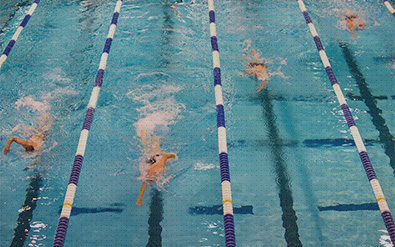By Kaitlyn Lambert, Account Executive
I’d like to start by saying that I’m no Michael Phelps, but I did swim competitively in high-school and still enjoy swimming recreationally now. During a recent swim at my local gym, I got to thinking about what a large impact the sport had on my early career and continues to have on me today. Time in the pool continues to be a go-to stress reliever, and the best cure for writer’s-block I’ve ever come across.
Looking back at my experiences with swimming through the years, I can identify specific ways that it has made an impact on how I work and has taught me lessons that are especially impactful on my approach to PR.
1. Be your best for yourself and your team
Swimming is a unique sport. Especially swimming for a school team, you’re competing both as yourself and representing the team. Once you’re in the pool there’s no one impacting your race but you, but the outcome of that race impacts your whole team. Few other sports have this direct link between individual performance and impact on the group. The individual aspect of the sport taught me responsibility, and that the best way to contribute to the success of the team is by being my best self.
I’ve found that PR offers a similar opportunity for individual achievement which benefits the entire team. My hard work may result in coverage benefitting a client, or an idea I have may help a teammate think of a new angle or secure coverage. All individual teammates are working towards the same goal, sometimes in collaboration and sometimes individually, but the understanding that my individual efforts help not only me to personally improve and find success, but helps the team to do so, encourages me to continue pushing myself.
2. The value of mentorship
Success doesn’t happen in a vacuum. While it’s up to you as an individual to push yourself and achieve success, having support, guidance, and positive mentors along the way will help you and can encourage you to keep working when things are tough. In swimming, this meant great coaches and teammates who gave practical advice and encouragement. In PR it’s managers, colleagues, and friends who listen to ideas, provide feedback, and help collaborate. Everyone can hit a wall at times, and a good mentor or encouraging teammates can be a huge factor as to whether you overcome the obstacle, or let it get in the way of your goals.
3. Setting goals and planning
A coach once told me that if we didn’t set goals for ourselves, then we’re just endlessly swimming back and forth in a pool going nowhere (which is funny because in swimming, that is exactly what it looks like you’re doing). Setting goals for yourself means that those endless laps back and forth are actually taking you somewhere, they’re taking you to a faster time, a smoother stroke, or whatever your goal may be. I’ve taken to approaching PR in a similar way. Without setting goals, without setting intention before starting a new project, there’s no way to measure your success, and you may find that you feel you’re going nowhere. Similarly, setting goals help you push yourself since you know that you’re working towards something. Without goals, and without a plan, there’s a tendency to be complacent, which never leads to success.



